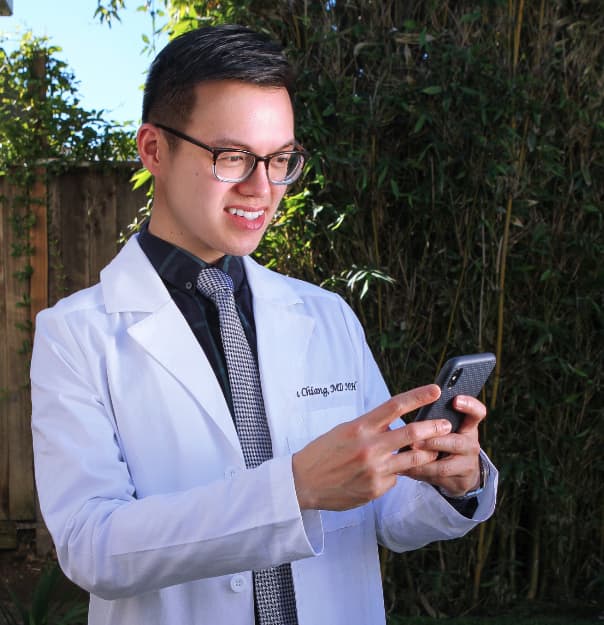
Austin Chiang has a unique role as a chief medical social media officer
Austin Chiang
The antidote to fake health news? According to Austin Chiang, the first chief medical social media officer at a top hospital, it's to drown out untrustworthy content with tweets, pics and posts from medical experts that the average American can relate to.
Chiang is a Harvard-trained gastroenterologist with a side passion for social media. On Instagram, where he refers to himself as a "GI Doctor," he has 20,000 followers, making him one of the most influential docs aside from TV personalities, plastic surgeons and New York's so-called "most eligible bachelor," Dr. Mike.
Every few days, he'll share a selfie or a photo of himself in scrubs along with captions about the latest research or insights from conferences he attends, or advice to patients trying to sort our real information from rumors. He's also active on Twitter, Microsoft's LinkedIn and Facebook (which owns Instagram).
One of Chiang's social media campaigns
Austin Chiang
But Chiang recognizes that his following pales in comparison to accounts like "Medical Medium," where two million people tune in to the musings of a psychic, who raves about vegetables that will cure diseases ranging from depression to diabetes. (Gwyneth Paltrow's Goop has written about the account's creator glowingly.) Or on Pinterest and Facebook, where anti-vaccination content has been far more prominent than legitimate public health information. Meanwhile, on e-commerce sites like Amazon and eBay, vendors have hawked unproven and dangerous health "cures, " including an industrial-strength bleach that is billed as eliminating autism in children.
"This is the biggest crisis we have right now in health care," said Chiang. "Everyone should be out there, but I realize I'm one of the few."
According to Chiang, doctors have historically been reluctant to build a following on social media for a variety of reasons. They view it as a waste of time, they don't know how, or they fear they might say the wrong thing and get in trouble with an employer. Others prefer to spend their time communicating with their peers via academic journals.
But as Chiang points out, most consumers do not pore over the latest scientific literature. So health professionals need to take the time to start connecting with them where they do spend their time — and that's on Facebook and Instagram.
So he's working to recruit an army of physicians, nurses, patient advocates, and other health professionals to get online. He's primarily starting on his home turf at Jefferson Health, and with other doctors in his specialty. He was appointed to his "new and unique role" in the summer of 2018, which he got after a series of conversations with the health system's CEO Stephen Klasko.
Klasko is a physician and avid social media user himself, with both professional and personal accounts. He's also a notorious straight-talker in the industry who openly discusses some of the more broken aspects of the heath-care system online and at conferences, including things like the inflated costs and the flaws of medical education.
Jefferson Health's Steve Klasko walking through campus.
Jefferson Health
In his new role, Chiang has been thinking about guidelines for health professionals on how to use the new digital tools, including things like disclosing any conflicts of interest. He thinks that more transparency about ties to industry will help doctors garner trust with the public. To spread these ideas, he's set up a new group for health professionals dubbed the Association for Healthcare Social Media.
He's also attempted a few hashtag-driven public awareness campaigns, including one called #verifyhealthcare to promote these ideas about disclosures, and another called #dontgoviral to counter anti-vaxxer content.
Klasko, Chiang's CEO, sees a direct business benefit to having Jefferson's approximately 3,000 doctors participating on social media.
"Everyone under the age of 35 uses Facebook and Instagram as a vehicle, and I want them to see Jefferson as a partner in their health so they'll think of us" he said.
More broadly, he shares Chiang's concerns about the proliferation of health misinformation. Measles cases are climbing, with outbreaks across the country, which many health professionals chalk up to parents refusing to vaccinate their children. That's one of the reasons that Klasko chooses to be so active online and with the media, so that people who want to access accurate information can find it.
"Imagine if it would be easier to access The National Enquirer than The Washington Post," he said. "I fear that that's what is happening in health care right now."
via IFTTT
No comments:
Post a Comment